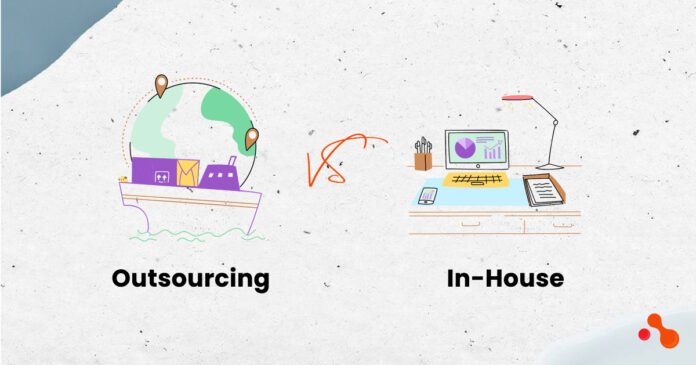Introduction
Software development is a crucial aspect of any business that relies on technology to deliver value to its customers. Software development is also a complex and costly process that requires skilled professionals. This is the main reason businesses face a dilemma: should they develop software in-house or outsource it to a third-party provider?
This article aims to give you a unique perspective and help you decide which one is good for your business – outsourcing vs. in-house.
The Pros and Cons
By understanding the pros and cons of both outsourcing and in-house development, a business can make more informed decisions on the method by which they wish to develop their project.
Here are the pros and cons of developing it in-house:
- Customization: It is easier to include custom features since you have complete control of an in-house project and can monitor it in-person.
- Control and Flexibility: With the in-house team you have direct contact with the development team with no electronic device or communication software. It means a higher level of control and greater flexibility.
- Confidentiality and Security: For businesses not willing to share sensitive information about their organization, this is the ideal method since it is easier to maintain confidentiality.
- Better Integration: It is simpler to preserve the company culture and integrate seamlessly with the existing system.
- Cost: This option is bound to cost more since there are several overheads to deal with, like infrastructure, equipment, software licenses, training, and other employee benefits besides the salary.
- Time: It is also more time-consuming, with the need to allocate dedicated company resources and a greater personal involvement.
- Limited Expertise: In cases where the in-house lacks expertise in a certain technology, it takes extra effort and cost to find professionals with specialized skills.
- Risk of Failure: The risk in case of failure is greater.
- Scalability Challenges: Scaling the development team or infrastructure might pose challenges. It is harder to offload resources as it is to expand.
Here are outsourcing benefits and drawbacks:
- Cost Savings: There is considerable cost savings when you outsource the development of your software. You will be paying only for the services you require and that too on a project basis.
- Access to Global Talent: This removes the limitations that restrict you from searching for professionals locally. Instead, you have the privilege of accessing the vast talent pool worldwide to find professionals with specialized skills.
- Faster Development: With a dedicated team working on your project, it also means faster time to market. This is highly beneficial in this highly competitive digital era.
- Focus on Core Activities: This allows you to focus on your core business activities while the outsourcing team handles the finer matters of your project.
- Scalability: When you hire remote developers, increasing or decreasing your team is easier. You can hire more developers or reduce the size of the remote team, thus making it more flexible to scale.
- Communication Challenges: Communicating efficiently can be harder since there is no direct contact; instead, one needs to invest in good software for this purpose. There are likely to be time zone issues as well, with the development team located in a different time zone. However, the advancements in technology and the willingness of offshore companies to offer a high level of flexibility or online meetings do help a great deal.
- Quality Control: There is greater potential of there being quality & trust issues. This can also be due to miscommunication or lack of alignment on the requirements. However, putting a little extra effort during the acceptance and testing stages can help rectify this issue.
- Security Concerns: It involves trusting the remote development company with sensitive information, which can be a cause for concern to a few businesses.
- Hidden Costs: There are usually no hidden costs; however, if the project development does not work out as per expectations, it might lead to additional legal costs.
- Less Control: There is no direct control over the project. In most cases, it means there will be a single point of contact to provide your requirements and obtain updates.
Balancing these pros and cons involves evaluating the specific needs of the organization, the complexity of the software, available resources, and long-term strategic goals. Sometimes, a hybrid approach, combining in-house development with selective outsourcing or leveraging IT Staff Augmentation Services, might be the most effective strategy.
Being Practical With Outsourcing vs. In-House
In the case where you choose to outsource, it essentially means that you are hiring resources outside your organization for a specific task. These are professionals with specialized skills to help deliver cutting-edge solutions. Outsourcing to a software development firm instead of a freelancer also means access to more resources than are usually required during the development stage.
It is highly likely that your software development requirements are beyond the expertise of your in-house team. It is more practical to hire a remote team in this case.
Outsourcing is more cost-effective and allows you to scale your business dynamically, thus making it the practical option for all businesses. It eliminates the need to invest in infrastructure and also eliminates several other expenses, making it the more practical option in most cases.
A Closer Look at Outsourcing vs. In-House Development
Outsourcing is a strategy adopted by firms who prefer to trust professional software development agencies with their requirements. This will typically involve a contractual agreement and a non-disclosure agreement (NDA) to finalize the terms of the development process and confidentiality of sensitive information. This is usually implemented on a project basis where the firm only pays for the services they require.
On the other hand, with in-house development, the firm depends on the internal resources to develop the software. They will either have an in-house team of developers or hire a skilled team of developers for this purpose. It will mean having to invest in infrastructure, equipment, and other additional resources.
What Companies Prefer – In-House development vs. Outsourcing?
More businesses than you might imagine outsource their requirements. In fact, a high number of firms choose to outsource to companies in India. This includes many types of companies like startups, as well as medium and large-size businesses.
Some of the firms that outsource various tasks:
- Slack
- American Express
- Expensify
- Microsoft
- Apple
- Wal-Mart
- Nike
- Cisco Systems
There are many reasons why businesses prefer to outsource. Some of the main reasons include reducing costs, focusing more on business activities, dealing with the additional workload, improving quality, and accessing a pool of talented developers and special business needs.
As per a study by Deloitte, this is why companies outsource:
- 59% to reduce cost.
- 57% to focus on core business activities
- 47% to solve issues of capacity.
- 31% to improve quality
- 28% to address critical business needs
- 28% to access intellectual Capital
- 17% to manage the business environment
- 17% to transform the business approach
Many types of industries can benefit from outsourcing their software development requirements and grow by focusing more on their core business.
One of the common issues is, how to find a good outsourcing partner? Acquaint Softtech is a software development firm with over 10 years of experience. We have highly skilled developers and offer remote teams for a wide range of technologies.
We have our headquarters in Ahmedabad, India, and have our presence in other countries as well like the USA and UK. Very few companies in Asia are official Laravel Partners; we happen to be one of them and offer a wide range of software development outsourcing services.
Key Factors for Decision-Making
Several key factors should be carefully considered before making the decision:
- Cost: First, establish your requirements to create an estimate of the cost involved. Compare the cost and benefits prior to making your decision.
- Business focus: For a business whose main focus is not software development and has nothing to do with technology. Having to set up an in-house team might not be practical. This is more true for firms that lack knowledge and expertise in this field.
- Expertise: Assess the type of skills you possess the expertise to handle the project or if you require the help of developers with special skills and resources.
- Risk: There are many different types of risks while developing your software solution. Identify the potential risk of your project. This can be a data security break, availability issue, or something else.
- Quality: Quality of code is a crucial issue for both in-house teams as well as when outsourcing. Opting for the in-house team will also mean having a dedicated QA team, while outsourcing means they will have the necessary resources for the job.
- Communication: It is easy to communicate with an in-house team since this would be direct communication. On the other hand, a special software tool is necessary to communicate with a remote team.
- Legal and Compliance Aspects: The legal implications of your project can vary depending on the type of project. A professional software development company will have the relevant knowledge for legal and compliance issues.
- Scalability: Almost all firms require a high level of flexibility when it comes to the ability to scale their operations. Outsourcing offers the most flexibility in this aspect.
- Cultural Compatibility: Evaluate the cultural impact of your decision and how your business can handle it.
- Long-Term Strategy: A business’s long-term strategy has a lot to do with making the right decision.
- Technology: Assess the tech stack of your choice and also the need to implement advanced technologies. A well-established software development firm might be more equipped to handle several technologies as well as advanced technologies.
- Trust & Security: Outsourcing means trusting the remote team with sensitive information and security of your data.
- Level of Personal Involvement: Depending on how much you want to be personally involved in the project, you can either opt to outsource or develop in-house.
The Verdict
The decision between in-house and outsourcing depends on factors like budget, project complexity, timeline, expertise required, and the level of control desired. Some companies opt for a hybrid approach, combining in-house expertise with selective outsourcing for specific tasks, striking a balance between control, expertise, and cost-effectiveness.
Firms benefit in many ways by outsourcing since the remote team is highly resourceful, has skilled developers, and it costs a lot less.
At the end of the day, a firm needs to make a decision based on their business model and several factors mentioned in this article.





